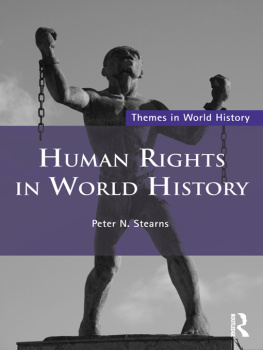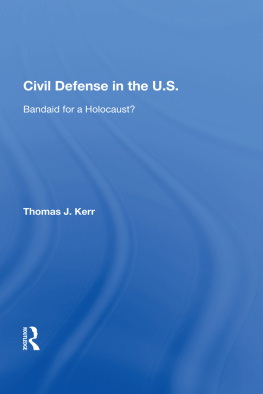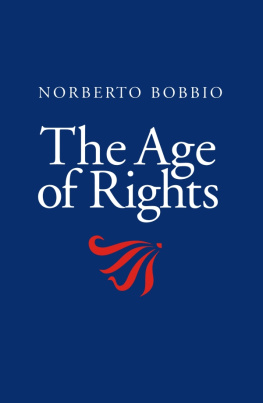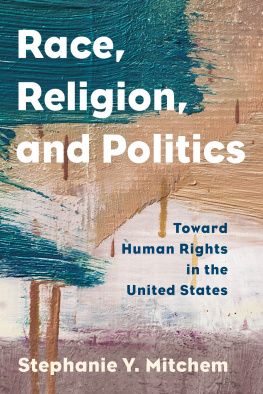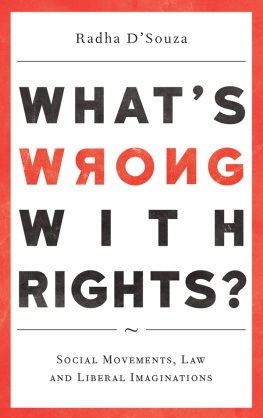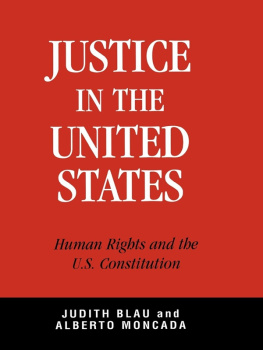Peter Kerr - Human Rights in a Big Yellow Taxi
Here you can read online Peter Kerr - Human Rights in a Big Yellow Taxi full text of the book (entire story) in english for free. Download pdf and epub, get meaning, cover and reviews about this ebook. year: 2013, publisher: Vagabond Voices, genre: Politics. Description of the work, (preface) as well as reviews are available. Best literature library LitArk.com created for fans of good reading and offers a wide selection of genres:
Romance novel
Science fiction
Adventure
Detective
Science
History
Home and family
Prose
Art
Politics
Computer
Non-fiction
Religion
Business
Children
Humor
Choose a favorite category and find really read worthwhile books. Enjoy immersion in the world of imagination, feel the emotions of the characters or learn something new for yourself, make an fascinating discovery.
- Book:Human Rights in a Big Yellow Taxi
- Author:
- Publisher:Vagabond Voices
- Genre:
- Year:2013
- Rating:3 / 5
- Favourites:Add to favourites
- Your mark:
- 60
- 1
- 2
- 3
- 4
- 5
Human Rights in a Big Yellow Taxi: summary, description and annotation
We offer to read an annotation, description, summary or preface (depends on what the author of the book "Human Rights in a Big Yellow Taxi" wrote himself). If you haven't found the necessary information about the book — write in the comments, we will try to find it.
Kerr examines the erosion of human rights in the West, with particular reference to Britain and the United States. A disturbing look at where the future might lead, if we dont realise whats going on.
Human Rights in a Big Yellow Taxi — read online for free the complete book (whole text) full work
Below is the text of the book, divided by pages. System saving the place of the last page read, allows you to conveniently read the book "Human Rights in a Big Yellow Taxi" online for free, without having to search again every time where you left off. Put a bookmark, and you can go to the page where you finished reading at any time.
Font size:
Interval:
Bookmark:
It was reported in the Guardian newspaper on Friday 10th December 2010 that a twelve-year-old schoolboy in Eynsham, Oxfordshire, was taken out of a class during school time and questioned by anti-terrorist police for trying to organise a protest picket outside the constituency office of the British Prime Minister David Cameron, who was also the MP for that constituency. The purpose of this picket was to protest at the threatened closure of the youth centre the young boy attended as a result of the Cameron governments budget cuts. An estimated 130 other children who use youth centres throughout the Prime Ministers constituency had been attracted to the idea through the Facebook website. During the interview with the police officer from Thames Valley police, the young boy, Nicky, was told that, if any public disorder took place outside the Cameron constituency office, he would be held responsible and would be arrested. He was then told that, even if he was not present during the disorder, he would still be held responsible and arrested. However, the officer then proceeded to tell this twelve-year-old boy that if the Prime Minister was in his office at the time, there would be armed officers in attendance. The officer then told the boy, so if anything out of line happens he stopped there and didnt elaborate any further. This interview took place in the formal setting of the school and in the presence of another adult in a position of authority, the boys head of year, but not in the presence of his parents. That this action terrified this young boy goes without saying. To most logical and intelligent people living in the modern setting of what we call a liberal democracy and a free society, such as the United Kingdom, terrorising a boy with threats of arrest and unspoken threats of being shot by armed police through the medium of the anti-terrorist branch of the police force in a formal setting flanked with authority figures identifies a terrorist state. In addition, most logical and intelligent people would ask themselves why the police were monitoring a twelve-year-old boys Facebook website in the first place? When situations like this arise within our nation, it is time for the citizens of the United Kingdom to pause and consider the political environment that now prevails in the UK that produces the type of police officer who would do such a thing as threaten a twelve-year-old boy with arrest and the possibility of being shot, and would obey an order from a superior officer to do such a thing in any circumstances. This is particularly relevant when the young boy is merely exercising a right, the right of peaceful protest that extends back to Magna Charta. Surely any normal intelligent human being, whether they are a police officer or not, would simply refuse to obey such an instruction? However, much more importantly, what kind of authority structure now prevails within our police forces that would order officers to not only monitor such websites, but order such action to be taken?
But of particular significance to all people in the UK is the question of what type of political mentality motivates any MP, let alone the Prime Minister, to sanction such an action? What on earth was Cameron afraid of from a twelve-year-old boy that he sent the anti-terrorist branch of the police to silence him and prevent his small, but perfectly legitimate, protest? I mean, these things just dont happen in Britain, do they? We protect our children; we dont threaten them with the might of the state, do we? Such an action would be shocking if it was taken against any citizen of the United Kingdom, but to visit this on a twelve-year-old schoolchild defies intelligent understanding. Incidentally, serious questions must be asked about the head teacher of the boys school who allowed the police to conduct themselves like that on school premises, particularly in the absence of the childs parents. In such circumstances that head teacher is responsible for the health and safety of all the pupils in his/her care and is responsible to the child and his parents, not to the police. What is happening to authority in the UK? Indeed, what is the nature of authority in modern Britain? What it does tend to suggest is that the authorities in the UK are losing their authority in the eyes of the public and are having to resort to raw power to achieve their objectives. Thats what happens in any social organisation, when the leaders fail to lead and fail to have the authority of their office recognised as legitimate; they resort to bullying, to raw power. Make no mistake; what those police (supported by a Prime Minister and the police and education authorities) did is outright bullying. Bullying is the response of the weak and cowardly. It is also the response of the incompetent. Bullying is one of the chief characteristics of modern Britain. It runs like a cancer throughout the whole society and in all organisations and institutions. Strong competent leaders, managers etc. have no need to bully. People recognise the strong and the competent and respect them. They also respect their authority. The competent manager has no need to bully. He/she leads by example, and subordinates follow and respect such examples. As a result, it is vital that we question and challenge occurrences such as those described above, and ask ourselves what they tell about the nature of the state and politics in modern Britain? These types of behaviour by the agencies of the state are a clear sign of an increasing authoritarianism that is unfortunately gathering momentum. One of the things it definitely suggests is, that from the perspective of the authorities in Britain, from the Prime Minister to the forces of law and order and officials at all levels, terrorism means any challenge to the system, the law, or any aspect of the status quo, whether by peaceful or legal means, or not. The dominant ideological, legal, economic or political system must not be challenged and any challenge will be deemed terrorist.
The 1998 Human Rights Act was a measure passed by the UK Parliament expressly for the purpose of allowing British judges to implement the rulings of the European Court of Human Rights in British courts. Since then twenty-five Acts of Parliament and fifty individual measures have been passed at this time of writing removing rights that were established in the Human Rights Act, as well as others that have been rights for British citizens since Magna Carta. Throughout this time sections of the British elite and their supporters in the media have sustained a campaign of denigration and open hostility to the European Court of Human Rights on the grounds that the Court infringes the sovereignty of Parliament. This is of course nonsense, as the 1998 Act was a deliberative decision of a sovereign parliament to embrace the philosophy and decision-making of the European Court. In addition, the British Parliament has a representative on the bench of the European Court, and is therefore involved in all decisions emanating from that Court. The problem is that the Court sometimes passes measures and makes rulings that the British dont like and so they take the huff when they dont get their own way and in the UK the elite must get their own way. This highlights a serious malaise at the heart of British government: the attempt to enshrine a standard of human rights and legal protections for the British people whilst at the same time actively removing rights, some of which are centuries old, and attacking the European Court responsible for maintaining and sustaining the rights you have just agreed to uphold in an Act of Parliament. There is only one conclusion you can draw from Britains behaviour: the 1998 Act was a public relations exercise that Parliament had no intention of taking seriously. There is thus a serious cause for concern in the behaviour of the British government, as this is neither sane nor rational behaviour, and results in the anti-terrorist branch of the police force monitoring childrens websites and terrorising them at their school. However, there is a demonstrable reason for such behaviour, and it is because British governments, since the election of Margaret Thatcher, have been zealous advocates of a free market neo-liberal economic theory that sees human rights as an economic cost, in addition to imposing political constraints on governments who now believe that being elected gives them the absolute right to do whatever they wish, whenever they wish to do it, whilst being totally unaccountable to anyone, particularly the electorate. Workers rights, for example, are a constraint on employers, and the neo-liberal cannot tolerate constraints on employers and the pursuit of profit. As a result, workers rights have been savagely attacked in a series of anti-union Acts of Parliament. Protests, regardless of their aims or the issues they are highlighting, are condemned for causing disruption and the police are allowed to act in whatever way they see fit to prevent such disruption. At the time of writing a debate is being conducted in the UK as to whether the police should be allowed to shoot demonstrators, and a group of eminent scientists has issued a warning that the government are planning to allow the police to use nerve gas against protestors. It was reported in the Independent newspaper on 7 February 2012 that:
Font size:
Interval:
Bookmark:
Similar books «Human Rights in a Big Yellow Taxi»
Look at similar books to Human Rights in a Big Yellow Taxi. We have selected literature similar in name and meaning in the hope of providing readers with more options to find new, interesting, not yet read works.
Discussion, reviews of the book Human Rights in a Big Yellow Taxi and just readers' own opinions. Leave your comments, write what you think about the work, its meaning or the main characters. Specify what exactly you liked and what you didn't like, and why you think so.



